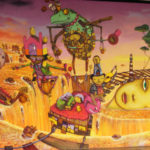
Sometimes the course of your life can turn on one small thing, one chance encounter. It happened to me, many years ago, the day Beverly invited me to visit her.
Of course I had the hots for her — pretty, round face, sparkling blue eyes, long blond hair. But ever since our one blind date during college, I had known we would never be more than friends.
I ran into her at Butcher and Stephanie’s wedding about a year after graduation. She was the maid of honor and I was an usher. During the reception, at a fancy club on the harbor in Marblehead, Massachusetts, Beverly and I wandered down the hill to the beach, got high, and played on the rocks at the water’s edge.
“I’m living with three other girls in Cambridge this summer,”she said. “Why don’t you come visit? Come hang out with us.”
Wow, four girls in one apartment! An attractive offer after four years of monosexual education at Dartmouth, and another year of monastic existence while teaching high school in northern Vermont. So a week later I drove to Cambridge to see her.
John, a former classmate of mine, was also visiting Beverly and her roommates. I hadn’t known him very well in college, though we shared a number of common friends, including Butcher. John had dated Stephanie for a while, but they’d broken up near the end of our senior year, and he had enlisted in the Army to keep one step ahead of the draft.
During the ensuing year, Butcher and Stephanie had started to date, become engaged, and planned their wedding in Marblehead. John had just finished his basic training and had some leave time before shipping off to Vietnam. So he had dropped in on Beverly.
“How was the wedding?”he asked when I first saw him. He laughed. “No problem, Stephanie and I were done a long time ago.”
We spent several days there, talking non-stop. It was like making a new friend. I told him about teaching, about my summer job, about visiting friends who hated law school. He talked about the Army, about basic, about Nam. Neither of us had a girlfriend or a clear direction in life. We were 22.
John went off to New Jersey to see his mom, and I went back to my parents’ house on Long Island. We agreed to get together once more before he shipped out, so we met the following week in Manhattan, had dinner, went to a movie, wandered the streets, and spotted Broadway Joe Namath, then star quarterback of the New York Jets, strolling along in an elegant suit, a babe on each arm. Then John and I stopped to sit by the fountain outside Lincoln Center.
“What are you going to do next?” he asked. I was under contract to teach for another year, but had no plans after that.
“Dunno,”I said. “How about youI? “I had imagined that John would get blown away in Nam. I was a product of my generation, and my heart ached for him. I’d been to peace marches, I smoked pot, I’d grown my hair, I’d seen Hair, and I had experimented with the occasional hallucinogenic. I was terribly afraid for John, even though I knew he was an army clerk, not a combat soldier.
Nevertheless, I asked bravely, “What are you gonna do after the army?”
“I’m thinking of going to film school,”he said.
That was a new idea. “What’s that? What do you do there?”
“I dunno. Study about movies, I guess. And make them.”
Cool. I loved movies. Dartmouth had had a film society. A five-dollar membership bought 30 films each quarter, many arty, imported, or offbeat, and all accompanied by lists of credits and student-written reviews. Also, the publicly owned Nugget Theatre in town ran two flicks at a time, often classics or foreign films, and changed programs twice a week. I’d often stayed up late with friends, talking about movies, but I didn’t know yet if I wanted to make them.
John survived the war. In the year he was gone, I completed my teaching obligation, flunked two draft physicals, and drew the amazingly fortuitous number 361 in the birthdate-based draft lottery. Though I had earlier sought admission to over a dozen law and journalism programs, I now applied to four or five graduate film programs around the country. I had no background in film, so Stanford was the only school to admit me. I prepared to move to California. John and I had been corresponding all year, and I knew he’d be back from Nam some time soon.
By midsummer, I was staying with my then-girlfriend at Butcher and Stephanie’s apartment in Berkeley, while they visited family back east. The phone rang early one morning. Drowsily I listened as she answered and told the caller, “No, they’re out of town for a few weeks while we take care of their place. Who? Oh yes. One moment.”
She handed me the phone. “It’s for you.”
It was John, who had just mustered out of the service in Oakland and had guessed I might be staying with Butcher. I woke up quickly. We got together, celebrated, talked, partied. Later that fall, after I started at Stanford, he moved in with my roommate and me, sleeping on the couch in our living room. A month later, he offered to pay rent. A few months after that, we rented a house and John willingly moved into that living room and continued to pay rent.
A level-headed fellow, John made himself useful on campus, acting and crewing for student films and working as a technician in the theatre department. The following year he was also admitted to the graduate film program, and he reconnected with Ann, whom he had dated early in our college years.
I met Susan late one night in an editing room. We had instant rapport and became close platonic friends for a year. On my 25th birthday we became lovers and began living together. That was 43 years, four apartments, two houses, and two kids ago. After seven years of cohabitation, we formalized our commitment and got married.
We remain good friends with John and Ann. Susan played the recorder at their wedding in the redwoods south of San Francisco. John was an usher at ours. We live five blocks apart. We joke that we always do the same things, but they often lead. They moved to our small town in the East Bay years ago. We liked it and followed suit. They bought a Toyota wagon, and so did we, a year later. Then Volvos. They had two kids spaced four years apart, and we did too, but two years behind them. Without consultation, we each bought the same barbecue and automated espresso coffee maker.
John still works as a film and video editor, often on major movies. Susan and Ann have retired from teaching and law. I recently retired from a long and interesting career as a cinematographer and also taught cinematography and lighting at four Bay Area colleges. I am writing books — first a memoir of my work and travels, and now a time travel novel called Finding George Washington.
I could never have guessed my life would turn out this way.
Susan and I visited Lincoln Center last summer, and I sat down by the fountain with her and recalled the chat when John had told me about film school, clarifying the path that my life would follow. The memory moved me, and I called him to share the moment, to recall the evening we saw Joe Namath.
Butcher and Stephanie’s marriage didn’t survive the first few years, but I saw Beverly again about a year after I started at Stanford. She turned up in Petaluma, California, living on a chicken ranch. I drove up to see her.
“Wanna drop acid and go see the New Riders of the Purple Sage?”she asked, a moment after I arrived. A product of my generation, I agreed, and we did. It was a surreal scene. Beverly drove us in her decommissioned, blue-and-white postal step van, through California back roads to a club in Cotati. We arrived hours early and took a table up front at the venue, tripping on acid as the road crew moved in and set up speakers, mics, amps, and instruments. The band finally arrived after we had sat there for a very long time. By our great good fortune, Jerry Garcia, who often played with the New Riders, sat down and played the pedal steel guitar about five feet in front of us.
It was a mindblowing evening, but I never saw Beverly again after that. I heard at one point that she had gone to South America, but I don’t know if that was true.
Though Beverly played only a small walk-on role in my personal narrative, her impact was huge. The course of my life had turned on my chance encounter with her. Without Beverly, I wouldn’t have run into John after the wedding. No John, no film school, no Stanford, no Susan. I could easily have ended up living in a different part of the country, with a different career and a different family.
When I called John from Lincoln Center, his phone rang a few times, then defaulted to a welcome message. No matter. Our chat decades before had set my destiny, and I didn’t mind babbling about it in a voice mail. I knew John would appreciate the moment. That’s what good friends are for.





